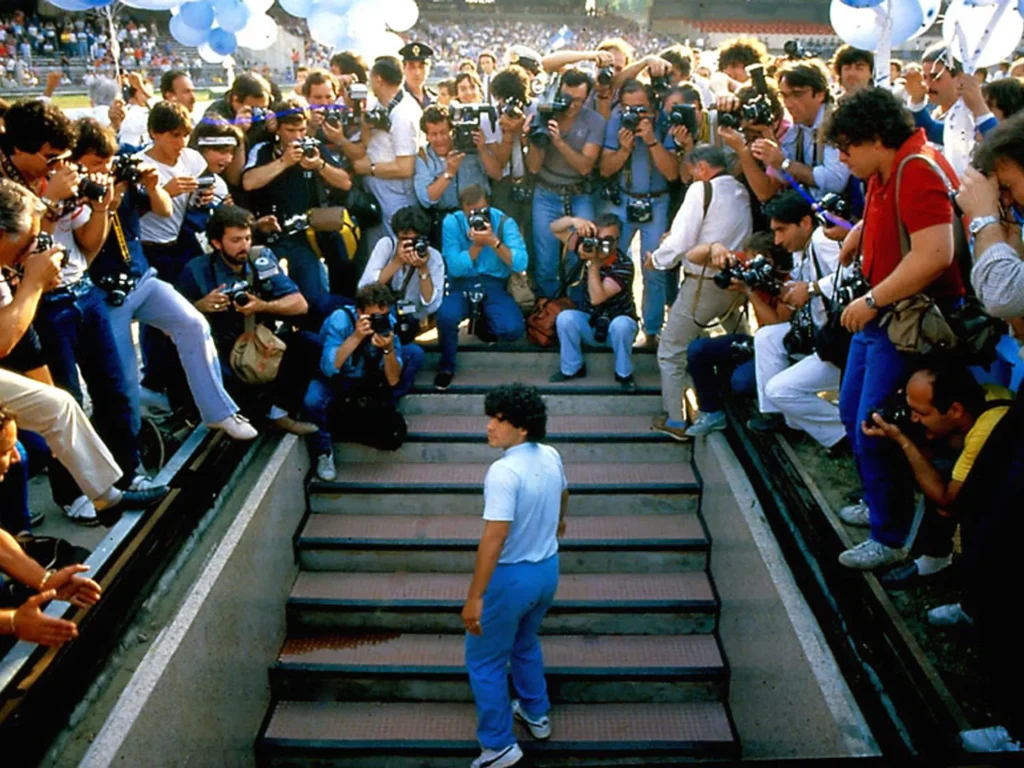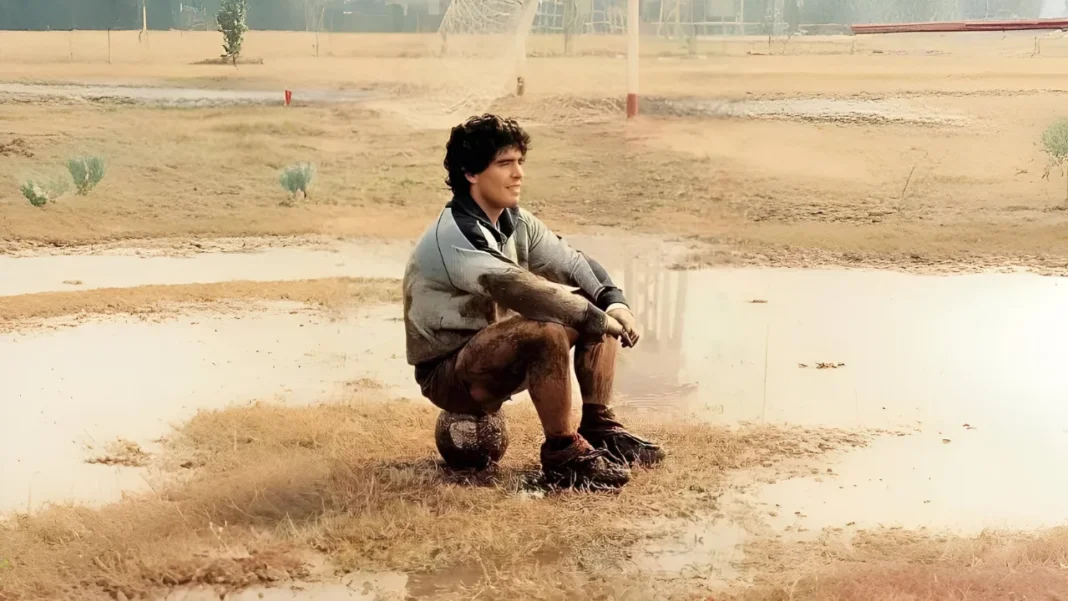There are football legends, and then there’s Diego Armando Maradona, a name that transcends sport, borders, and generations. For most, he’s remembered for the magic left foot, the World Cup in 1986, and the chaos that followed him everywhere he went.
But behind the wild stories, the controversies, and the fame, there was another side of Maradona that doesn’t get talked about enough: the man with a heart that couldn’t say no to people in need.
And perhaps the best example of that came one day in Naples, when he defied Napoli’s management to play a small charity match for a sick child who needed help.
The Side of Diego Maradona no one talks about
Diego Maradona’s roots
Before diving into that story, let’s remind ourselves just who Maradona was. Born in the slums of Villa Fiorito in Buenos Aires, Diego rose from poverty to become one of the greatest footballers in history. From dazzling Boca Juniors in Argentina to tearing up Europe with Barcelona and Napoli, Maradona was more than a footballer; he was a symbol of hope for millions who came from nothing.
At Napoli, he became a god. He didn’t just win trophies; he gave the city its pride back. Under his leadership, Napoli won two Serie A titles, a Coppa Italia, and a UEFA Cup, achievements that no one in southern Italy thought possible at the time. But Maradona’s influence went beyond football. He became the voice of the working class, a hero for the underdog.
What made him truly special, though, was that even at the height of fame, he never forgot where he came from.
The Kind Side of Maradona

For all the headlines about his lifestyle, Diego Maradona quietly helped people throughout his life. By the time of his death in 2020, reports claimed he was financially supporting as many as 50 families in Argentina and abroad. In one interview, he said it himself:
“I’m feeding 50 families. I’m providing for 50 families.”
According to Marca, he was spending close to 10 million Argentine Pesos a month, much of it going towards helping his entourage, employees, and people he cared for. That’s not the kind of generosity that makes headlines, but it paints a clearer picture of who he really was.
Beyond personal charity, Maradona was also an ambassador for Football For Unity, a project by the British charity TUFF.EARTH, which aimed to teach children from different backgrounds about unity and human values through football.
Anna Bornholt-Prior, one of the co-founders of the charity, recalled:
“There’s a common notion that Diego Maradona was anti-British, but he actually did great things for our charity. He had a really big heart, and we were honored to have him as an ambassador.”
That might surprise some, but it fits perfectly with the story of what happened in Naples a moment that showed Maradona’s defiance wasn’t always about rebellion; sometimes, it was about compassion.
When Maradona played a charity match against Napoli’s wishes
The story begins in Naples, where Maradona was at the height of his powers. Napoli’s streets were painted with his murals, his face appeared on posters, and kids dreamt of being the next Diego.
One day, a reserve team player approached him with a heartfelt request. A local father had reached out, desperate for help. His child was seriously ill and needed expensive medical treatment abroad. The community was organizing a small charity football match to raise funds, and they wanted Maradona to play.
For most footballers, especially global superstars under strict club contracts, that would have been a polite “no.” Too risky, too informal, too against the rules. But Diego wasn’t like most footballers.
Without hesitation, he agreed.
Going Against Napoli’s Orders
When Napoli’s president at the time, Corrado Ferlaino, heard about it, he wasn’t pleased. The idea of his most valuable player, the world’s best footballer, running around a muddy, uneven pitch with local amateurs sounded insane.
He strictly forbade it. The club couldn’t risk Maradona getting injured in a non-official game. But Diego didn’t care. He was never one to play by the rules, especially when it came to helping others.
According to Corriere Della Sera, Maradona went ahead against Napoli’s wishes and even paid the insurance fee himself to make sure he could take part in the match legally. The report described the pitch as “a potato field,” a far cry from the lush green surfaces of Serie A.
But that didn’t matter to him. He wasn’t there for the glory; he was there for a cause.
The Match
Footage from that charity game still exists, and it’s both surreal and beautiful.
Maradona, dressed in a simple kit, is seen warming up in a cold parking lot, surrounded by locals who can hardly believe their eyes. The greatest player in the world, the man who had conquered Italy and the world, was about to play for them not in a stadium of 60,000, but on a scrappy neighborhood pitch.
Once the match began, Diego did what Diego always did: he put on a show. He dribbled, smiled, joked, and even slid around in the mud. He scored goals for fun, celebrated with the crowd, and gave everyone watching a story they’d tell their grandchildren.
By the end of the day, the game had raised around £8,000, enough to cover the child’s travel and medical expenses. For those who witnessed it, it wasn’t just a football match it was a moment of humanity, joy, and community spirit brought to life by a man who understood both fame and struggle better than anyone.
This story sums up everything that made Maradona unique. He wasn’t perfect. He broke rules, argued with authority, and made plenty of mistakes. But beneath all that chaos was a man who cared deeply about people, especially those who had nothing.
That charity game in Naples wasn’t a PR stunt or a calculated gesture. It was pure instinct, a moment where his heart spoke louder than his manager or the club president.
In an era where modern footballers often live in bubbles, carefully managed by agents and sponsors, it’s hard to imagine someone of Maradona’s stature doing something so raw, so real. He didn’t need cameras or headlines. He just showed up, played football, and changed someone’s life.
Conclusion
When Diego Maradona passed away in November 2020, the world mourned not just a football genius but a human being who wore his heart on his sleeve.
His legacy isn’t only in goals, dribbles, or trophies; it’s in stories like this. Stories where he used his fame not for himself, but for others. Stories where he was more than a player; he was a symbol of generosity, defiance, and humanity.
As the footage of that muddy charity match continues to circulate online, one can’t help but wonder: how many of today’s superstars would do the same? How many would risk a strained hamstring or the wrath of their club, just to help a stranger in need?
Maybe that’s what made Diego Maradona truly immortal. He didn’t just play football. He lived it, felt it, and shared it with everyone.
In the end, Diego Maradona didn’t just win matches. He won hearts.


